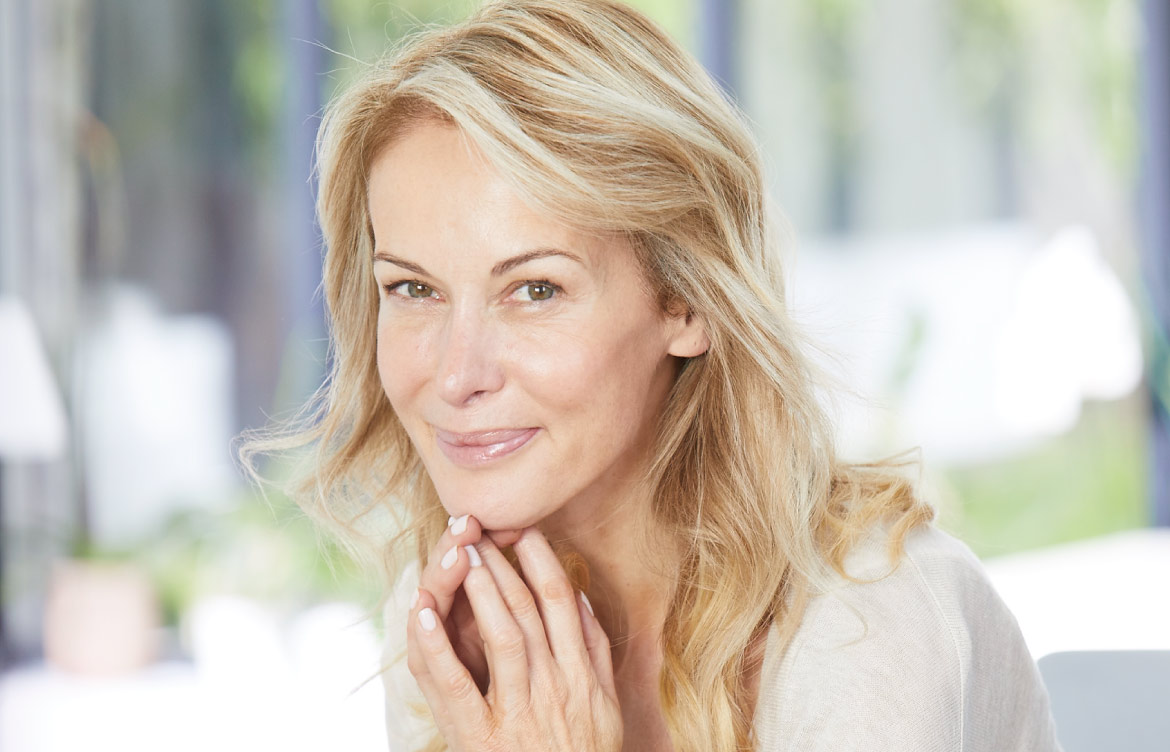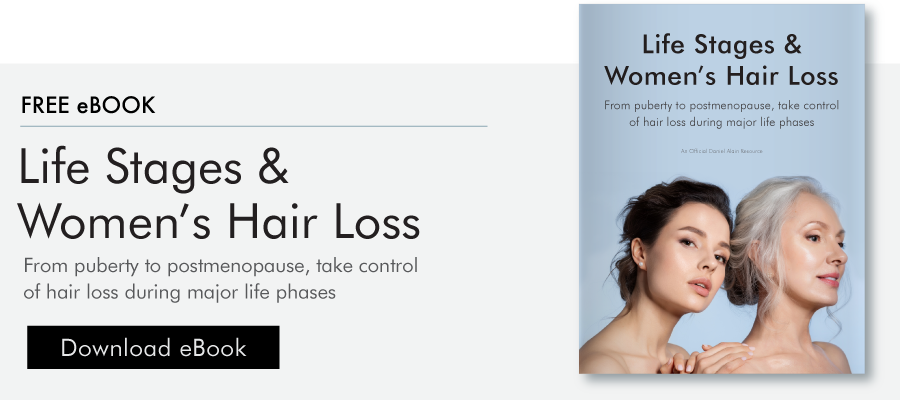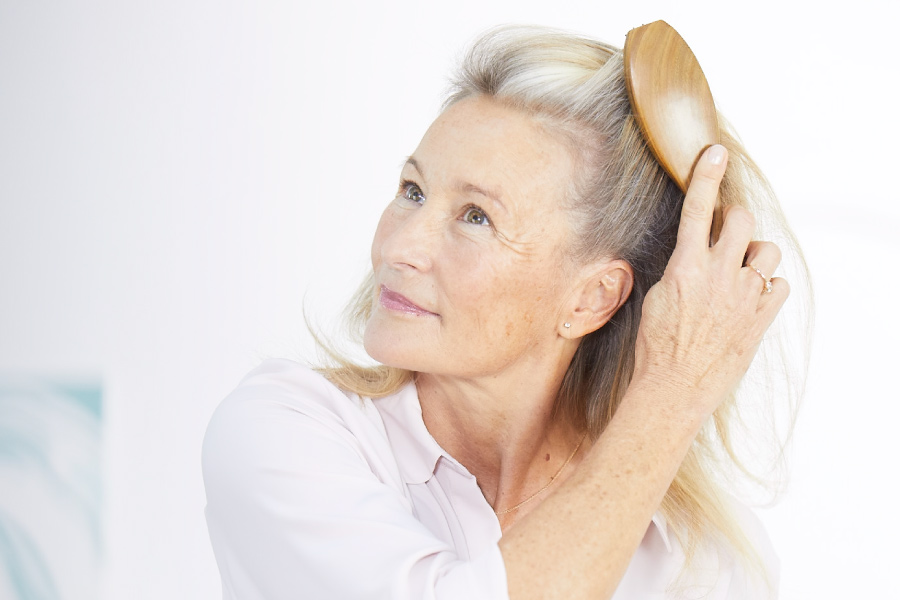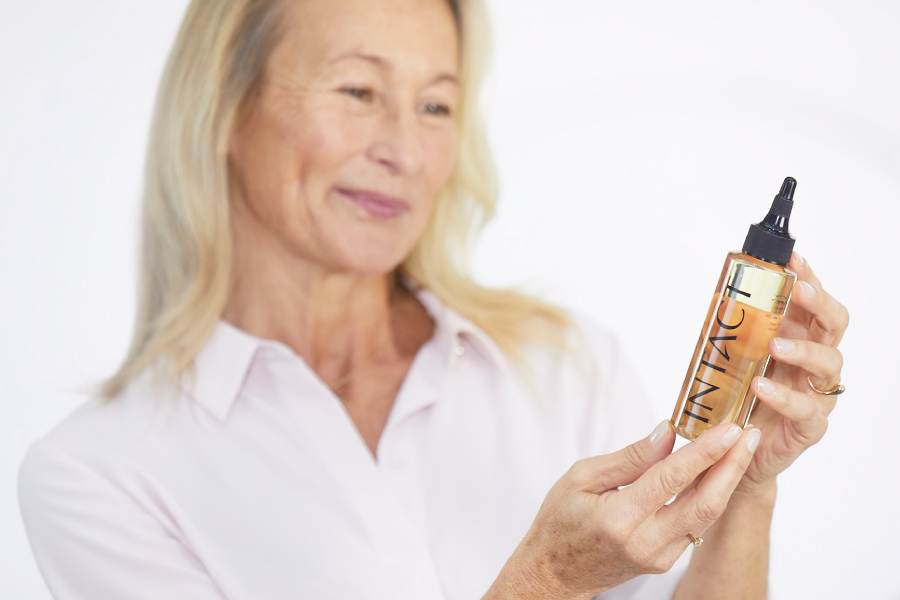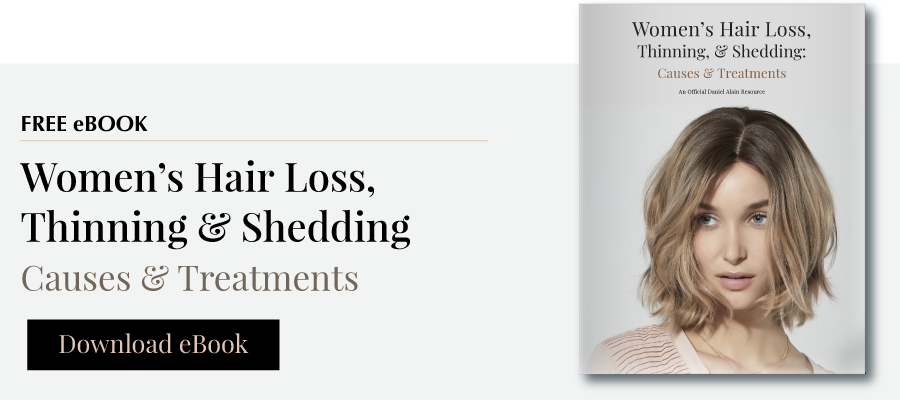While the changes our bodies go through as we age can wreak all sorts of havoc (night sweats, anyone?), there's nothing more emotionally distressing than watching your hair fall out by the handful. Hair loss during menopause is common, with over half of women over the age of 50 experiencing it.
But even though the odds can feel stacked against you, menopausal hair loss isn't a permanent life sentence. There are steps you can take to lessen your symptoms and keep your locks looking healthy and lustrous through menopause and beyond. That's right: Menopause may be inevitable—but hair loss doesn't have to be.
CAN MENOPAUSE CAUSE HAIR LOSS?
Menopause is a blow. No one is arguing that. But the relationship between menopause and hair loss isn't as doom-and-gloom as you might think.
Like all of the irritating symptoms you'll experience during this natural process, post-menopausal hair loss is a direct result of your imbalanced hormones. You see, as we go through this shift, our levels of estrogen and progesterone start to dip while our levels of androgens (male hormones) begin to rise. These hormones are the sole reason hair stays on your head and grows at a subjectively "normal" pace. As their power wanes and the androgens' influence strengthens, hair follicles start to miniaturize—which means they produce thinner, shorter hairs until they eventually stop growing hair altogether.
Unlike the bald spots or receding hairline that your hubby or male siblings be battling, thinning hair during menopause tends to happen gradually and evenly across your whole head. It's more subtle (yay!), and harder to spot in its early stages (boo!). You might notice that your part is widening, that you can see more of your scalp when your hair is pulled back, or that your hair feels thinner than it used to. Finding large clumps of hair in your brush or in the shower drain is also a pretty common occurrence as it's much easier for your strands to fall out during high-shed activities like washing and brushing.
Try not to panic. Although menopausal hair loss is directly linked to your hormones, it doesn't mean you're powerless against it.
does hair grow back after menopause
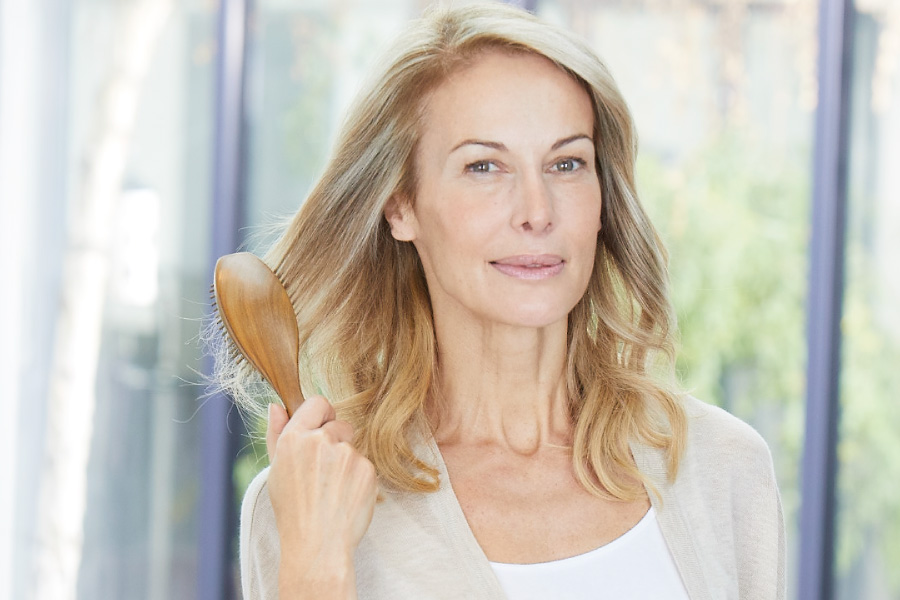
The short answer is yes, but the long answer is a bit more complex. Hair loss after menopause is—thankfully—temporary. But when your hormones have settled, and your body returns back to its natural balance, your hair might not be the same as it was before.
New, post-menopausal strands are not as strong as pre-menopausal strands. They're also thinner and more likely to break. And though your scalp will continue to grow hair, it'll likely be less dense than it was in your youth. So while you won't be totally bald, you might notice that your mane isn't quite as thick or lustrous as it used to be.
It's important to note that permanent hair loss only occurs when the root is severely damaged. That only happens when you've been neglecting your hair health for years with things like:
- Wearing daily super-tight hairstyles
- Constantly coloring your strands
- Using shampoos, conditioners, and styling creams with heavy chemicals
- Eating a diet that's high in processed foods
- Not staying hydrated
Luckily, it's never too late to start taking better care of your hair—and your body. Implementing practices that nurture your strands (like regular scalp massages, deep conditioning treatments, and protective styles) can help minimize the amount of hair you lose during menopause and strengthen the hair that does grow back.
How to Reverse Thinning Hair after Menopause
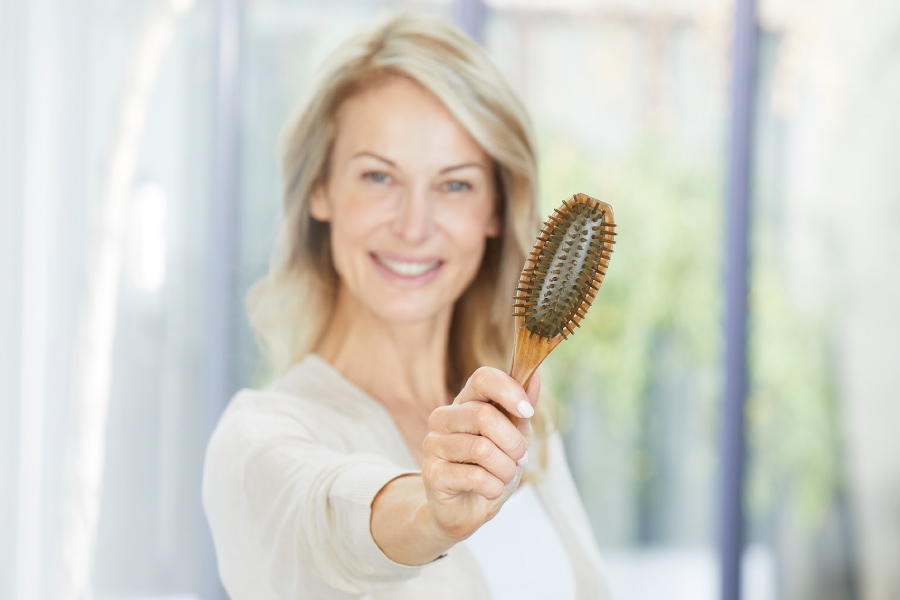
Menopause and thinning hair don't have to go hand-in-hand. Taking care of your strands during this time—and throughout your life—is crucial to maintaining a healthy head of fabulous tresses. But it's not as simple as popping a celebrity-endorsed pill or applying an expensive prescription cream. The honest truth? No menopause hair loss treatment is the cure-all it claims to be.
Restoring your hair back to its pre-menopausal glory requires a two-fold approach that simultaneously stops hair loss in its tracks and keeps the strands still on your head healthy and strong. Finding the right menopause hair loss treatment will require some investigating and experimenting on your part (here are a few places to get started), but trust us—it'll be worth it when you finally find the products and practices that help bring your hair back to life.
While everyone's plan of action will be different, there are some strategies that tend to work across the board when it comes to tackling thinning hair after menopause:
- Get to the root of the problem by getting your hormone levels checked. Understanding which hormones (and vitamins) are out of balance can help you better target your menopause hair loss treatment.
- Ditch the harsh chemicals. Now is the time to switch to a sulfate-free shampoo, avoid over-processing your hair with heat and chemicals, and be more mindful of the ingredients in your hair care products.
- Eat for your strands. Your hair is made up of protein, so make sure you're getting enough of it in your diet. Also, incorporating foods that are high in omega-3 fatty acids, iron, and zinc can help promote hair growth.
- Consider supplements. In addition to eating a balanced diet, you might also want to take vitamins or supplements that are specific to hair health. But don't do so before checking your levels, as taking a vitamin you're not deficient in won't do much of anything.
- Drink lots of water. Your brittle and dry strands are begging for home H2O. Combat menopausal hair loss by downing eight cups of water a day (or more, if you can swing it).
- Take breaks from tight hairstyles. If you wear your hair in styles that require tight pulling (think: buns, ponytails, and braids), give your scalp a break and opt for looser styles instead.
- Keep your scalp healthy. A healthy scalp is the foundation for strong, healthy hair, so it's important to take care of it. That means regularly cleansing it, giving it daily massages (which also help with hair growth), and using products that are specifically designed to treat your scalp.
- Protect your strands from the sun. Just like your skin, your hair is susceptible to sun damage. So make sure you're using a leave-in conditioner or serum that contains SPF when you know you'll be spending extended periods of time outdoors.
- Reduce stress. Menopause itself is stressful, not to mention the hundreds of other stressors we all have in our lives. But living with chronic stress isn't good for your hair health. Figuring out how to eliminate or significantly reduce the major stressors in your life—along with practicing some stress-relieving activities like yoga or meditation—can help improve your overall well-being and, as a result, the health of your hair.
- Be gentle during high-shed activities. Brushing, washing, and styling your hair when it's already dry and brittle can cause breakage. So be extra careful during these activities, and use an anti-shedding serum like INTACT to help reduce shedding and keep your strands strong.
As you can see, it takes a multi-pronged approach to get hair loss during menopause under control. But with a little, time, effort, and TLC, you can put your balding fears to rest and enjoy a full head of gorgeous, healthy locks for years to come.
INTACT Anti-Hair Shedding Treatment

When you're dealing with post-menopausal hair loss, every strand counts. INTACT ensures that you keep your hair out of the drain and where you want it—on your head.
Our patented PiliLock® Sevilla Orange Complex stimulates the muscles around your hair follicles so they grip each strand and lock them into place during high-shed activities like brushing, washing, and styling. This dermatologist-tested-and-approved serum starts working in just 10 minutes by increasing the force it takes to pull hair out, reducing shedding by up to 77%.
The more you use INTACT, the stronger and healthier your hair becomes. With regular use, you can see a significant decrease in hair loss and an overall improvement in the condition of your strands. Click here to grab your bottle of INTACT Root Securing Complex and start combating post-menopausal hair loss today!
START RESTORING YOUR POST-MENOPAUSAL HAIR TODAY!
You deserve to feel confident in your own skin, no matter what changes menopause throws your way. And the sooner you start securing your strands with INTACT, the less hair you'll lose to this distressing (but totally natural) aging process. All it takes is 30 minutes for INTACT to start working its magic—so don't wait; grab your bottle today!
Our patented PiliLock® Sevilla Orange Complex contracts the small muscles around each hair follicle to prevent hair shedding before it starts, without harsh chemicals. It's also proven to immediately decrease hair shedding by up to 77% during brushing. In other words: INTACT is a treatment for hair loss in women that works with your body, not against it, to give you the best results possible.
Nourishes & Hydrates the Scalp
A healthy scalp is the foundation for strong, healthy hair. INTACT's plant-based nutrients work to nourish and hydrate the scalp, providing the perfect environment for hair growth.
Volumizes Hair
As the muscles around your hair follicle are tightened, each strand is given a little lift. The result? Fuller, thicker hair that looks like it belongs on the red carpet.
Clinically Proven
INTACT is a hair loss treatment for women that has been clinically proven to stop hair shedding and increase hair density in just one use. By using INTACT regularly, you can expect to see a decrease in hair shedding, an increase in hair density and fullness, and a healthy scalp.
Works in 30 Minutes
Say goodbye to weeks and months of waiting for results. INTACT works in just 30 minutes, so you can see a difference in your hair right away. Just apply it to your scalp before your shower, leave it in for 30 minutes, and then shampoo and condition as usual.
Contains Ingredients You Can Trust
INTACT is one of the top treatments for women's hair loss because it’s made with only the highest quality, natural ingredients. Our signature root-securing formula is made with niacinamide (B3), GMO-free corn sugar, panthenol (B5), and coconut fatty acids. INTACT is also sulfate, parabens, silicones, oils, SD-alcohol, artificial dyes, and gluten—not to mention vegan-friendly and color-safe.
Delivers the Impressive Results in Just One Use
With INTACT, you can expect to see a decrease in hair shedding, an increase in hair density and fullness, and a healthy scalp—all in just one use! Plus, the more you use it, the better your results will be.
DISCOVER THE RIGHT menopause HAIR LOSS TREATMENT AT DANIEL ALAIN
Watching your tresses fall out can be heartbreaking, but it in no way means that you're doomed to thin, lifeless hair forever. There are treatments for women's hair loss that work—and many of them can be found at Daniel Alain.
We believe that every woman deserves to have the hair of her dreams. Achieving your ideal mane could mean securing your strands with INTACT, rocking a human hair topper or wig, or testing your DNA to see if Minoxidil will work for you. Hair loss is a journey, and we'll be with you every step of the way.
Book a complimentary consultation with us to find the best solution for menopause hair loss for you!
book a free consultation
Our stylists will help you find the right hair loss solution just for you.

Frequently Asked Questions
Does Hair Loss From Menopause Grow Back?
Yes—hair loss from menopause is temporary and does grow back. However, the strands that do grow back will likely be thinner and much easier to break than they were before. That's why it's so important to take steps to protect your strands before, during, and after menopause.
How Can I Stop Hair Loss During Menopause?
You can't stop hair loss during menopause altogether, but you can take steps to slow down the shedding and make your strands stronger. That includes testing your hormone levels to see what's out of balance, eating a healthy diet, taking necessary supplements, using anti-shedding products like INTACT, and being gentle with your hair. The more you do to proactively take care of your strands, the less hair you'll lose during menopause.
How Long Does Hair Loss Last During Menopause?
There's no singular answer to this question since every woman experiences menopause differently. Since menopause itself can take anywhere from seven to 14 years to fully play out, it's not uncommon for hair loss to persist throughout that entire time frame. However, taking steps to protect your strands can help minimize the amount of hair you lose during menopause.
How Can I Fix My Hormonal Hair Loss?
Fixing hormonal hair loss starts with testing your hormone levels to see which ones are out of balance. Once you know what's going on, you can start working with a doctor to find the best way to get your hormones back in check. This might include changes to your diet, supplements, and even medications. Other hair care practices like avoiding tight hairstyles, scalp massages, and using anti-shedding products like INTACT can also help to minimize hair loss.
What Vitamins Help Hair Loss Menopausal?
The vitamins that have the best chance of improving your menopausal hair loss are the ones that you're specifically deficient in. While supplements like biotin and folic acid are popular and can certainly produce results, they only work if you're actually deficient in them. The best way to determine which vitamins you need is to get your blood tested by a doctor. That way, you can focus on taking the supplements that will actually make a difference for your hair.
How Can I Thicken My Menopausal Hair Loss?
Restoring thickness to your mane during or after menopause requires both getting to the root cause of your hair loss and using the right haircare products. That means testing your hormone levels, eating a healthy diet, taking supplements as needed, using an anti-shedding product like INTACT, and being gentle with your strands. Daily scalp massages and thickening shampoos and conditioners can also help to give your strands a boost.
What is the Best Vitamin for Hair Falling Out?
There's no one-size-fits-all answer to this question since the best vitamin for hair falling out depends on what's causing the shedding in the first place. However, some of the most commonly recommended vitamins for hair loss include biotin, folic acid, and Vitamin D. If you're not sure which vitamin your hair needs the most, get your blood tested by a doctor to find out.
What is the Best Shampoo for Menopausal Hair Loss?
When it comes to finding the best shampoo for menopausal hair loss, you want to look for one that's specifically designed with natural, hair-boosting ingredients like keratin, biotin, and jojoba oil. Avoid shampoos made with sulfates, as they can strip away the natural oils your strands need to stay healthy. And be sure to follow up with a conditioner to help hydrate and protect your strands.
Does Biotin Help Menopausal Hair Loss?
It can—so long as you're actually deficient in it. Biotin has long been touted as the end-all, be-all solution for hair loss, but it only works if you're actually deficient in biotin. The best way to determine whether or not you need biotin is to get your blood tested by a doctor. If you are biotin deficient, taking a supplement can help to improve your menopausal hair loss.
Why is My Hair Falling Out in My 50s?
Menopause tends to start between the ages of 45 and 55, which means that hair falling out in your 50s is likely due to hormonal changes. However, there are other potential causes of hair loss in your 50s, so it's important to speak with a doctor to rule out any underlying health conditions.

